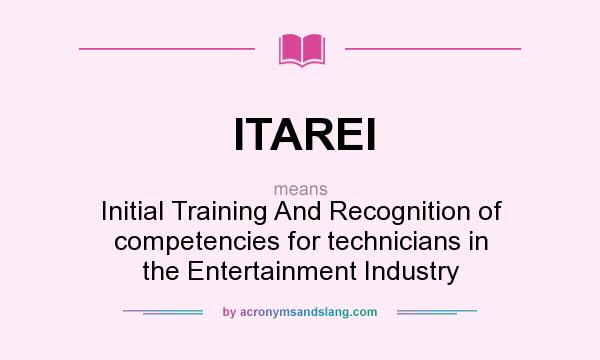What does ITAREI mean?
ITAREI means Initial Training And Recognition of competencies for technicians in the Entertainment Industry
This acronym/slang usually belongs to Undefined category.
What is the abbreviation for Initial Training And Recognition of competencies for technicians in the Entertainment Industry?
Initial Training And Recognition of competencies for technicians in the Entertainment Industry can be abbreviated as ITAREI

|
|
Most popular questions people look for before coming to this page
| Q: A: |
What does ITAREI stand for? ITAREI stands for "Initial Training And Recognition of competencies for technicians in the Entertainment Industry". |
| Q: A: |
How to abbreviate "Initial Training And Recognition of competencies for technicians in the Entertainment Industry"? "Initial Training And Recognition of competencies for technicians in the Entertainment Industry" can be abbreviated as ITAREI. |
| Q: A: |
What is the meaning of ITAREI abbreviation? The meaning of ITAREI abbreviation is "Initial Training And Recognition of competencies for technicians in the Entertainment Industry". |
| Q: A: |
What is ITAREI abbreviation? One of the definitions of ITAREI is "Initial Training And Recognition of competencies for technicians in the Entertainment Industry". |
| Q: A: |
What does ITAREI mean? ITAREI as abbreviation means "Initial Training And Recognition of competencies for technicians in the Entertainment Industry". |
| Q: A: |
What is shorthand of Initial Training And Recognition of competencies for technicians in the Entertainment Industry? The most common shorthand of "Initial Training And Recognition of competencies for technicians in the Entertainment Industry" is ITAREI. |
Abbreviations or Slang with similar meaning
- UCSJ - Union of Councils for Jews in the Former Soviet Union
- ABEO - Association of Baptists for Evangelism in the Orient
- IFEX - International Forum of Export & Marketing Executives in the Elevator Industry
- WOCP - Worldwide Organization for Collaborations in the Pharmaceutical Industry
- CARGO-OPS - Innovation in the training and Assessment of Cargo Operations Personnel in the ports industry
- DATES - Development And Testing of standardised teaching modules in the field of regenerative, Ecological energy techniques and their transfer to EU member States
- DATIS - Training for the Dissemination and Application of Technological resource management in Textile Industry SMEs
- ECOHAB-GOM - Ecology and Oceanography of Harmful Algal Blooms in the Gulf of Maine
- GOPFFY - Geometry optimization of flow meter systems in the food industry
- LUBRIFECTION - A new, environmentally friendly, efficient technology for the Lubrication, cleaning and disinfection of bottle conveyor belts in the beverage industry
- MEARC - Training of trainers and technicians in the renaturalisation and reforestation of the Mediteranean Environment, through Application of Regulations CEE 2078 and 2080 and computerised training methods
- MICROMARE - Development of Microsensors for use in the Marine Environment
- SOLEIL - Development, testing and distribution of solar technology modules in the initial vocational training of plumbers and electricians
- TFI-SME - Tele-training for the development of new professional profiles in the Financial Industry and the development of Small and MediumEnterprises
- TIFIPI - Training of Instructors and Facilitators In the Petrochemical Industry
- ACRH - Annotation of Corpora for Research in the Humanities
- crew scheduling. - The process, some would say the art and science, of assigning personnel in a variety of transportation settings, especially in the aviation industry.
- guest segregation. - In the hotel industry, the practice of providing separate floors or sections for different categories of guests, such as families and business travelers or men and women.
- rate fence. - In the hotel industry, any number of characteristics that are used to determine the rate for a room. For example, a physical rate fence would involve the location of a room; a product-line rate fence
- turn-down service. - In the hospitality industry, the practice of preparing a hotel room for bedtime by partially unmaking the bed, turning on lights to a low level, turning on the radio, and so forth.